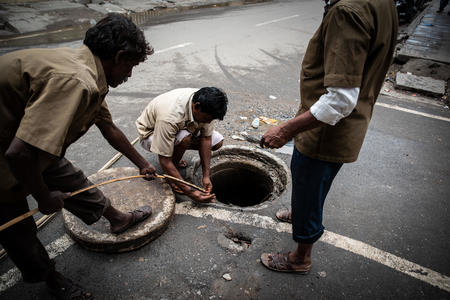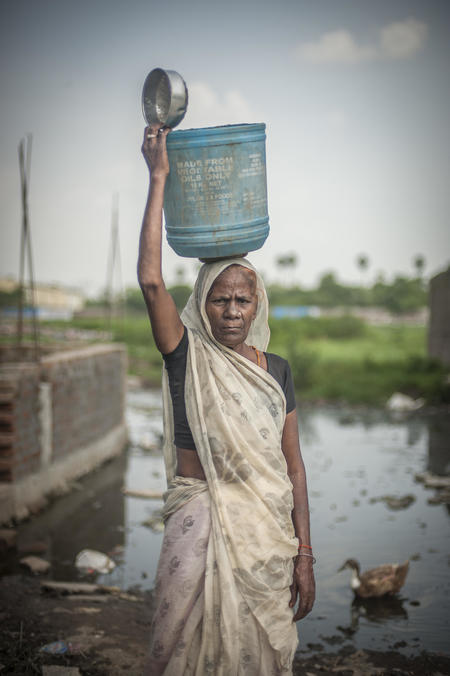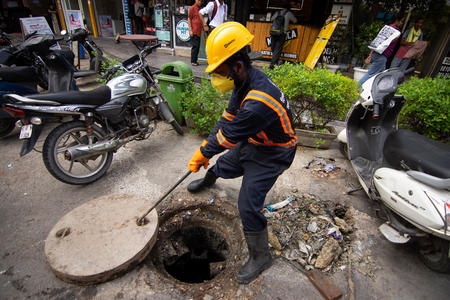Sanitation workers in South Asia: on the margins of society, on the frontline of COVID-19

Sanitation workers’ vital roles put them on the frontline – often forgotten – during COVID-19 lockdowns. Already marginalised in many societies, how has the pandemic affected their safety and wellbeing? Shahrukh Mirza and Andrés Hueso discuss our research with sanitation workers across South Asia, highlighting how to support them through the pandemic and beyond.
Sita Devi* has been working as a sweeper in the municipality of Lahan in Nepal for 15 years. She recalls the terror in her Dalit community when COVID-19 reached Nepal, and how people started washing their hands more and distancing from each other.
While she appreciates all the precautions people are taking, Sita worries about how much she can protect herself. She worries that she might be contracting the virus from her work and wants to bathe after returning home, to protect her family, but the community water tap is far from their home, and she often has to rush back to cook the evening meal.
*Pseudonym to protect her identity.
Sanitation workers were already marginalised, especially in South Asia
Sita and thousands like her are the hidden workforce that has kept towns and cities functioning during the lockdowns imposed across much of South Asia from March. Despite providing an essential public service, sanitation workers have long been marginalised across the region. They often work in terrible conditions, handling waste manually and with little protective equipment, leaving them highly exposed to risks of injury, infection and even death.
While formal employees like Sita are at least guaranteed a regular salary, the money is often insufficient and not paid when due. “Last night, we slept on empty stomachs,” she said. “Though my salary is Rs 21,000 per month, my employer does not pay my salary on time. I have to keep looking for food to feed my family of five.” For thousands of informal workers, even this nominal job security is missing.
Along with the safety hazards and financial challenges, sanitation workers often face stigma and discrimination. This is especially severe in South Asian countries because the work is assigned to religious minorities and to those considered lowest caste.
The coronavirus pandemic left sanitation workers at increased risk
When the COVID-19 pandemic hit, sanitation workers were on the frontline. While healthcare workers were rightly applauded for their immeasurable contributions during the pandemic, the workers who emptied our garbage; cleaned our hospitals, quarantine centres and streets; and kept sewers systems running were largely neglected, despite their vital work in the midst of unprecedented risk.
As one sanitation worker from Khulna, Bangladesh, put it, “Sanitation workers like me are the reason people can live at home during the lockdown […] We are continuing our job under great risk only to give the public some level of comfort. But it is very unfortunate that people do not value our sacrifice.”
Challenges of sanitation work during COVID-19 lockdowns
To understand the realities of sanitation workers under COVID-19 lockdowns, we facilitated studies across Bangladesh, India, Nepal and Pakistan, through phone interviews with people working in sanitation and waste management, town authorities and civil society experts. Although we noted differences between countries, the studies revealed many common challenges workers are facing in the absence of proper guidance, protective equipment, health insurance or safety nets.
- Limited protection in the face of COVID-19
While the vast majority of workers we spoke to were aware of the symptoms of and risks posed by COVID-19, many were ill-equipped to manage the dangers. Many had not received specific guidance or formal training on dealing with COVID-19-specific threats.
While workers usually had access to some form of personal protective equipment (PPE), this was rarely sufficient in terms of fit, quality and regularity of supply. For example, in Bangladesh, half of respondents mentioned having to spend their own money to buy PPE, and more than a third said they did not get supplies as frequently as required. Across Bangladesh, India and Pakistan, workers also reported overheating while using PPE in high temperatures.
In the same way, although workers knew handwashing was key to protecting themselves from infection, proper practice was hindered by limited access to handwashing facilities and supply while at work, especially considering sanitation workers move from location to location during the day. Where facilities were readily available, as was reported in Pakistan and Nepal, practice of hand hygiene was better than in Bangladesh and India, where access to facilities was more limited.
- Adverse impact on livelihood, especially among informal workers
Many of the workers fared better than did other low-income groups because their status as essential workers enabled them to keep working through lockdowns. But some categories of workers struggled with loss of employment, delayed payments and loss of opportunities to earn a supplementary income.
On average, around half of respondents (66% in Bangladesh, 44% in India, 50% in Pakistan, 61% in Nepal) reported new challenges in meeting their daily expenses due to loss of income, rising food prices, additional expenses for safety gear and hygiene supplies, and higher cost of transportation under lockdown conditions.
Informal workers were the worst hit because they had no regular income to fall back on, and many alternative sources of income, such as domestic work, were not available. This had gendered implications, because a high proportion of the informal workforce is female. For instance, in India, where dry latrine cleaners are almost invariably women, one in four respondents in this category were completely out of work during the lockdown, while others were only able to partially resume work.
- Deepening existing inequalities
The pandemic exacerbated existing vulnerabilities, most severely affecting informal workers, female workers and those without access to health insurance or other forms of social protection. Only 35% of workers in India and 42% in Nepal reported being covered by any form of insurance; no workers in Pakistan or Bangladesh, and no informal worker in any of the countries, had any insurance coverage.
While there were examples in some countries of targeted support for sanitation workers, these were often sporadic and limited in scale, leaving most workers to manage any impacts on income and rising expenses on their own.
- Changes in social attitudes towards sanitation workers
The consequences of COVID-19 for social attitudes towards sanitation workers were mixed across the four countries. In some cases, workers received more recognition from the public and employers, and felt proud of providing essential services during the pandemic. Conversely, some workers in Bangladesh reported concern and pressure from neighbours to not return home after work, while in Nepal there were even reports of demands from landlords for workers to vacate their homes.
The immediate and long-term actions crucial to supporting these key workers
Although there are contextual differences, these studies point to the need for urgent and concerted action to address the immediate threats sanitation workers face, and for longer-term measures to address the historical inequalities that have left them vulnerable in the first place.
To support sanitation workers to cope with the pandemic, regional actors, national governments, municipal authorities and non-governmental stakeholders must urgently:
- Recognise the vital roles of sanitation workers and the risks they face.
- Provide emergency financing to support their safety and welfare during the pandemic.
- Establish protocols for safe sanitation, waste and cleaning services, including on training and PPE.
- Strengthen social security schemes and access to health insurance targeted to compensate for risks and protect workers, ensuring inclusion of informal workers.
- Ensure access to water, sanitation and hygiene in workplaces and communities.
In the longer run, we must all work towards a more humane future in which those who take on such risks to fulfill one of society’s most essential functions are recognised as skilled professionals and treated with the dignity and respect they deserve. This should include:
- Reviewing urban plans and investments to integrate considerations of sanitation workers.
- Supporting workers’ representation and engagement with authorities.
- Supporting research and innovation on sanitation and waste work.
- Supporting the long-term formalisation of sanitation and waste work.
- Launching an awareness campaign that challenges the stigma and discrimination sanitation workers face.
The COVID-19 pandemic not only reinforces the strong but overlooked moral and public health imperative to protect sanitation workers’ rights – it also represents an opportunity to redress the historical neglect.
Shahrukh Mirza is Regional Programme Officer – South Asia and Andrés Hueso is Senior Policy Analyst – Sanitation. Andrés tweets as @andreshuesoWA






